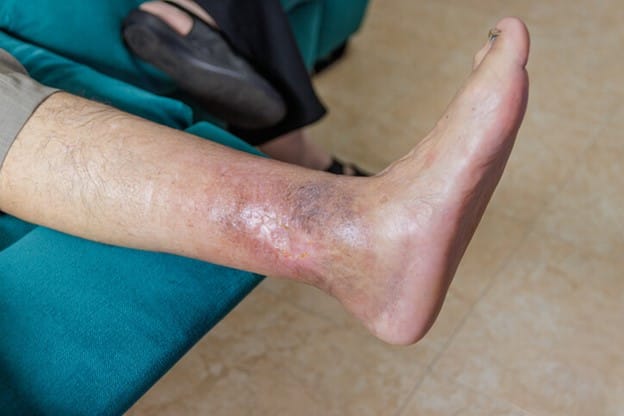
Diabetic wounds are chronic wounds that are slow to heal. If you have severe or unmanaged diabetes, your lifestyle or health conditions may put you at a greater risk of developing a diabetic wound. Without proper care and treatment, diabetic wounds can become infected and cause serious health complications. If you are unable to properly care for a diabetic wound yourself, you will benefit from working with a certified wound care specialist.
Certified wound care specialists are experts in assessing, managing, and treating diabetic wounds, as well as educating patients and caregivers on proper wound care and prevention. A CWS uses modern wound care innovation and state-of-the-art technology to accelerate healing, promote recovery, and improve overall health and wellness. Here is a look at how certified wound care specialists can help with diabetic wound care management in Portland, OR; Los Angeles, CA; Vancouver, WA; and Nashville, TN.
A diabetic wound is a chronic wound on the foot, heel, or toe. Chronic wounds are slow to heal, which can increase the risk of infection and other complications. Diabetics are at a higher risk of developing these chronic wounds because high blood sugar levels can damage blood vessels and cause poor circulation.
A certified wound care specialist (CWS) is a healthcare professional who has undergone extensive, specialized training and has earned a certification that demonstrates their expertise. Certified wound care specialists are experts in wound care services, including assessing, diagnosing, treating, managing, and preventing complications from wounds. Their certification is earned through the American Board of Wound Management. A CWS could also be a nurse, doctor, physical therapist, or other licensed medical practitioner.
While some people are capable of properly cleaning, dressing, and caring for a diabetic wound, others may have conditions that make it hard for them to perform their own wound care. Consider working with a professional certified wound care specialist if you:
A professional, certified wound care specialist has extensive training and education in the assessment, debridement, management, and prevention of diabetic wounds. They understand how diet, nutrition, lifestyle, and health conditions contribute to the development and progression of diabetic wounds, and they are able to quickly assess a wound’s stage in the healing process. Your wound care team can evaluate your health, lifestyle, and environment to determine which factors are contributing to your chronic wound. They can then design a personalized wound care treatment plan that addresses these underlying factors, relieves pain and discomfort, improves hygiene, accelerates healing, and reduces the risk of infection. Other benefits of working with a certified wound care specialist are:
When you work with a certified wound care specialist, they can help you take greater control over your diet, lifestyle, health, and other factors that increase your risk of diabetic foot wounds and other complications of diabetes. They offer collaborative, highly personalized healthcare services, and will work closely with you, your healthcare team, your caregivers, and your friends and family to develop an individualized wound care program. Your certified wound care specialist will:
Diabetic wounds are typically caused by a combination of factors. Their development and healing process are influenced by symptoms of diabetes, complications related to unmanaged or severe diabetes, and lifestyle. The most common causes of diabetic wounds are:
Other factors that can increase your risk of developing a diabetic wound are older age, obesity, a sedentary lifestyle, poor diet or nutrition, hypertension, and poor circulation in the arms, hands, legs, and feet.
If you have diabetes, check in regularly with your physician, nutritionist, and diabetes specialist to get assistance managing your condition and assessing your progress and overall health. These specialists can help you understand your risk level for developing a diabetic ulcer or diabetic wound. They will evaluate your risk by considering factors like:
Recognizing early warning signs of a diabetic wound can ensure you get the wound care and treatment you need to prevent the condition from progressing. Inspect your feet regularly for signs of cuts, abrasions, punctures, or wounds and visit your physician if you notice that a wound is slow to heal. The most common symptoms of diabetic wounds are:
Without daily care and treatment, diabetic wounds are at risk of developing complications. Due to underlying health issues associated with diabetes, such as obesity, poor circulation, a sedentary lifestyle, and poor diet or nutrition, diabetic wounds are more susceptible to complications than other types of wounds. The most common complications of untreated diabetic wounds or slow-healing or chronic wounds are:
At BH Wound Care, we have a team of certified wound care specialists who offer highly personalized, compassionate, and comprehensive wound care services. We specialize in the treatment of diabetic wounds and diabetic ulcers, venous and arterial ulcers, pressure sores, and other complications from diabetes. We use cutting-edge treatment and management methods and state-of-the-art technology to provide advanced wound care services.
Diabetic ulcers can cause serious complications that affect every aspect of your life, so we offer swift and comprehensive treatment, wound care education, and collaborative care coordinated with your healthcare team. Call us now or contact us online to schedule a consultation for diabetic wound care in Portland, OR; Los Angeles, CA; Vancouver, WA; or Nashville, TN.

Struggling with a non-healing wound can be incredibly frustrating, but you don’t have to face it alone, BH Wound Care has you covered.
By harnessing the power of advanced, evidence-based medical technologies, we aim to expedite the healing process, helping you get back to your life wound-free. Our ultimate goal is to achieve complete healing for every patient we serve.
Our highly trained specialists work in tandem, ensuring comprehensive care. Whatever your requirements, we’re here to help you through every step of the healing journey, from handling referrals to insurance authorizations and beyond.
With regular follow-ups and unwavering support, we keep a close eye on your progress, ensuring the quickest possible recovery.
Don’t let non-healing wounds hold you back any longer. Experience the difference at BH Wound Care and rediscover a life without limitations.
